Complementation tests - Study guides, Class notes & Summaries
Looking for the best study guides, study notes and summaries about Complementation tests? On this page you'll find 9 study documents about Complementation tests.
All 9 results
Sort by
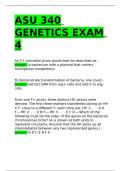
-
Bio 340 Online ASU Exam 2
- Exam (elaborations) • 6 pages • 2024
-
- $14.49
- + learn more
Loss of function Mutations Cause a gene to lose some or all of it's normal function Hypomorphic mutations Genes that have lost only some of their function Previous Play Next Rewind 10 seconds Move forward 10 seconds Unmute 0:03 / 0:15 Full screen Brainpower Read More Null mutations Genes that have lost all of their function Haplo-sufficient One (haplo) copy is sufficient to produce the wild-type phenotype in the heterozygous genotype Fully dominant ...
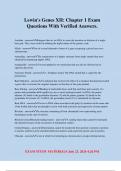
-
Lewin's Genes XII: Chapter 1 Exam Questions With Verified Answers.
- Exam (elaborations) • 8 pages • 2024
- Available in package deal
-
- $11.49
- + learn more
Lewin's Genes XII: Chapter 1 Exam Questions With Verified Answers. Acridine - answerMutagens that act on DNA to cause the insertion or deletion of a single base pair. They were useful in defining the triplet nature of the genetic code. Allele - answerOne of several alternative forms of a gene occupying a given locus on a chromosome. Annealing - answerThe renaturation of a duplex structure from single strands that were obtained by denaturing duplex DNA. Antiparallel - answerA term applie...
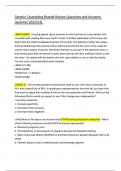
-
Genetic Counseling Boards Review Questions and Answers (summer 2023/24).
- Exam (elaborations) • 65 pages • 2023
-
- $10.49
- + learn more
Genetic Counseling Boards Review Questions and Answers (summer 2023/24). - A young patient (5yrs) presents for the first time to a new dentist with crowded teeth, making them very hard to clean. In further exploration of the issue, she learns that the child had delayed eruption of his teeth. The patient's mother also relays that her pediatrician has several times noted how prominent the veins of his scalp are and his short stature. However, she thinks that this is just part of the spectrum ...
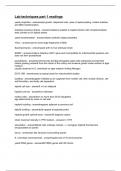
-
Lab techniques part 1 readings
- Exam (elaborations) • 3 pages • 2024
-
- $9.99
- + learn more
yeast properties - answerrapid growth, dispersed cells, ease of replica plating, mutant isolation, and DNA transformation isolating recessive strains - answermutations isolated in haploid strains with complementation tests carried out in diploid strains yeast transformation - answerutilizes synthetic oligonucleotides YACs - answerused to clone large fragments of DNA Saccharomyces - answeryeast with no true wild-type strain S288C - answercontains defective HAP1 gene and incompatibl...
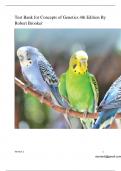
-
Test Bank for Concepts of Genetics 4th Edition By-stamped
- Exam (elaborations) • 344 pages • 2024
-
- $40.49
- + learn more
Version 1 1 Test Bank for Concepts of Genetics 4th Edition By Robert Brooker Version 1 2 Student name:__________ 1) The basic unit of heredity is the ___________. A) individual B) gene C) macromolecule D) trait 2) A variation of a gene is called a(n) _______. A) species B) morph C) genome D) allele E) proteome 3) Which of the following acts to accelerate chemical reactions in a cell? A) nucleic acids B) lipids C) carbohydrates D) enzymes Version 1 3 4) The building blo...
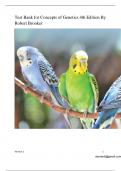
-
Test Bank for Concepts of Genetics 4th Edition By-stamped
- Exam (elaborations) • 344 pages • 2024
-
- $39.49
- + learn more
Version 1 1 Test Bank for Concepts of Genetics 4th Edition By Robert Brooker Version 1 2 Student name:__________ 1) The basic unit of heredity is the ___________. A) individual B) gene C) macromolecule D) trait 2) A variation of a gene is called a(n) _______. A) species B) morph C) genome D) allele E) proteome 3) Which of the following acts to accelerate chemical reactions in a cell? A) nucleic acids B) lipids C) carbohydrates D) enzymes Version 1 3 4) The building blo...
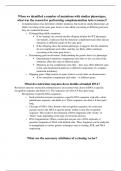
-
Molecular Genetics and Enzymology: Lecture 33 Study Guide
- Class notes • 4 pages • 2024
-
- $8.49
- + learn more
This study guide outlines key concepts discussed in Lecture 33, focusing on molecular genetics, enzyme function, and protease specificity. It covers topics such as complementation tests, restriction enzymes, cloning vectors, and the mechanisms of protease action. Additionally, it explores the specificities of trypsin, chymotrypsin, and caspase and discusses the safety mechanisms that prevent clotting factors from causing widespread protein degradation.

-
21. In phage T4, 11 recessive mutations were mapped by pairwise recom
- Exam (elaborations) • 1 pages • 2023
-
- $7.47
- + learn more
21. In phage T4, 11 recessive mutations were mapped by pairwise recombination tests to 0 .2 4 .6 .8 1.0 1.2 1.4 1.6 1.8 2.0 2.2 a single small region of the phage chromosome, which contains 4 genes, as shown in the map of that region. All required an amber mutant host to grow, failing to grow in a WT host. Double infections of a wild type host by pairs of these mutants were carried out to test for complementation. Predict for each 51 6 34 7 118 10 map units e to lyse the WT host (-) 6 8 9 1...
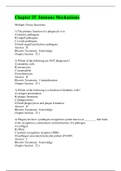
-
Chapter 25 Immune Mechanisms,100% CORRECT
- Exam (elaborations) • 23 pages • 2021
-
- $17.49
- + learn more
The primary function of a phagocyte is to A) destroy pathogens. B) engulf pathogens. C) evade pathogens. D) both engulf and destroy pathogens. 2) Which of the following are NOT phagocytes? A) dendritic cells B) monocytes C) neutrophils D) erythrocytes 3) Which of the following is a function of dendritic cells? A) antigen presentation B) plaque formation C) phagocytosis D) both phagocytosis and plaque formation 4) Phagocytes have a pathogen-recognition system known as _______...

How did he do that? By selling his study resources on Stuvia. Try it yourself! Discover all about earning on Stuvia


